| Srl | Item |
| 1 |
ID:
130610
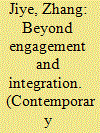

|
|
|
|
|
| Publication |
2014.
|
| Summary/Abstract |
As part of its new strategy of "retuming to the Asia-Pacific region", the A Obama administration has adopted some tough economic policies towards China, notably promoting the Trans-Paci?c Partnership (TPP) and attempting to establish new rules of international trade and investment aimed at strengthening economic ties with other Western countries through the Trans-Atlantic Trade and Investment Partnership Agreement(TTlP ), both of which tend to compress the geopolitical space for China's economic rise. The administration is also using a 'green barrier' to suppress the development of China's high-tech industry, and using economic diplomacy and investment restrictions against Chinese state-owned enterprises. This paper seeks to examine and analyze the causes of shifts in the U .S. economic strategy towards China.
|
|
|
|
|
|
|
|
|
|
|
|
|
|
|
|
| 2 |
ID:
132340
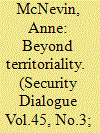

|
|
|
|
|
| Publication |
2014.
|
| Summary/Abstract |
The key contention of this article is that contemporary practices of border security threaten to outrun the explanatory capacity of the spatial (territorial) and subject (citizen/migrant) registers habitually employed to think through human mobility. This represents a political problem as much as an empirical one. First, it implies that migration scholarship deploying categories of analysis informed by prevailing registers offers a limited perspective on contemporary techniques of migration governance; second, it suggests that such scholarship obscures the operation of power that works to enforce profoundly unequal hierarchies of mobility and represent them as politically neutral. In this article, I propose that resisting reversion to problematic categories of analysis offers the potential to think of human mobility without the state and territory as its foremost container concepts. I contend that such an approach - 'beyond territoriality' - is a crucial step on the way to negotiating the normative dimensions of border politics. The case is developed empirically via a grounded investigation of the mundane yet symptomatic practices of border security on the Indonesian island of Bintan.
|
|
|
|
|
|
|
|
|
|
|
|
|
|
|
|
| 3 |
ID:
111646
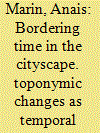

|
|
|
|
|
| Publication |
2012.
|
| Summary/Abstract |
Place renaming is an archetypical feature of regime change in (post-)Soviet Russia. In the case of Leningrad / St. Petersburg it is interpreted here as an attempt at temporal boundary-making: in renaming streets, local elites tried to erect a symbolic time border between 'old' and 'new'. Since post-Soviet renaming mostly amounted to returning to places the maiden names they bore in the imperial period, toponymic changes since the perestroika did not imply a radically new semiotic mapping of the cityscape. In choosing memory landmarks for cultural self-identification that refer to an idealised European past, place-namers also tried to establish normative boundaries to situate St. Petersburg in a desired geopolitical space. Like other discursive constructions, these renaming processes are not free of contradictions however.
|
|
|
|
|
|
|
|
|
|
|
|
|
|
|
|
| 4 |
ID:
075098
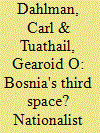

|
|
|
|
|
| Publication |
2006.
|
| Summary/Abstract |
This article analyses how the strategic Bosnian locality of Br?ko emerged as a distinctive geopolitical space during the post-war period. This resulted from the struggle between separatist nationalisms and the international community over the status of displaced persons in Bosnia, but this struggle played out differently in the municipality of Br?ko as its status was unresolved at Dayton and for years afterward. Post-war nationalist rivalry to determine Br?ko's status through the manipulation of displaced persons provoked the creation of the Br?ko District as a territorial condominium nominally shared by Bosnia's two entities but under direct international supervision. Drawing upon fieldwork in Bosnia, we develop a critical geopolitical account of Br?ko from wartime through the post-war period to the present. The article concludes by considering whether Br?ko as a third geopolitical space holds potential to offer Bosnia a third space, overcoming the oppositional binaries of the war.
|
|
|
|
|
|
|
|
|
|
|
|
|
|
|
|
| 5 |
ID:
138215
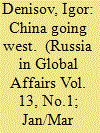

|
|
|
|
|
| Summary/Abstract |
Plans to create a Silk Road Economic Belt, which Chinese President Xi Jinping unveiled in a speech at the Nazarbayev University on September 7, 2013, at first sight looked nothing but a beautiful historical allusion, a nice figure of speech that had dawned upon official speech-writers or Foreign Ministry officials responsible for preparing Xi's trip to Central Asia.
|
|
|
|
|
|
|
|
|
|
|
|
|
|
|
|
| 6 |
ID:
184335
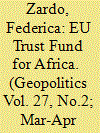

|
|
|
|
|
| Summary/Abstract |
As a response to the migration crisis, the EU has not only revised its policies but also mobilized resources, introduced new tools, or adapted the existing ones to the changing context. While the debate at the policy level is burgeoning, instruments have been limitedly explored. What kind of geopolitical dynamics are EU migration policy instruments producing? How do they contribute to redesigning the EU-African geopolitical space? The article combines a policy instruments approach with a spatial perspective on the EU migration policy. Through the analysis of the 2015 EU Emergency Trust Fund for Africa, it raises the argument that migration policy instruments are powerful spatial practices that are shaping the EU-African geopolitical space by coordinating the EU’s and Member States’ priorities and understandings of migration. Overall, the paper suggests that research on the EU external relations, particularly in the realm of migration, should not only pay more attention to policy instruments but also map them in the targeted territories to avoid “cartographic traps” and better understand the impact of the policies under scrutiny.
|
|
|
|
|
|
|
|
|
|
|
|
|
|
|
|
| 7 |
ID:
122365
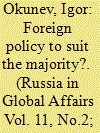

|
|
|
|
|
| Publication |
2013.
|
| Summary/Abstract |
The Russian geopolitical code is shifting from Western-centric to non-Western-centric, and from global to regional. The formation of a new center of power around Russia may not be smooth. It will inevitably face resistance from countries which Moscow considers to be part of its geopolitical space.
|
|
|
|
|
|
|
|
|
|
|
|
|
|
|
|